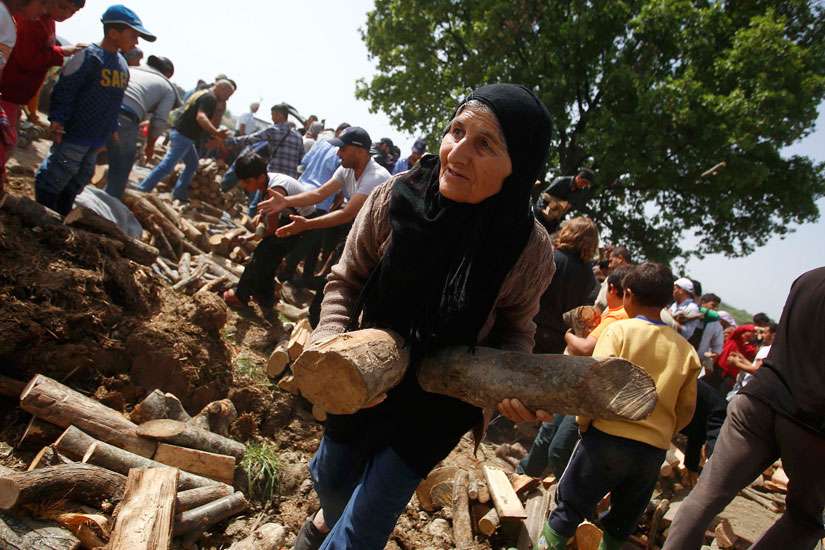Releasing the detailed schedule for the Pope's trip April 16 to Lesbos, Greece, Jesuit Father Federico Lombardi, Vatican spokesman, said the Pope and the Orthodox leaders wanted to draw attention to "a situation in which many people are suffering" and where a "solution worthy of the human person" still must be found.
Pope Francis is making the trip with Ecumenical Patriarch Bartholomew of Constantinople and Orthodox Archbishop Ieronymos II of Athens and all Greece. The three are scheduled to visit the Moria refugee camp, which the European Union has designated as a "hotspot" for registering those seeking asylum in Europe and from where those whose applications are denied are sent back to Turkey, which was their last stop before entering Greece and, therefore, EU territory.
Lombardi said the religious leaders would be welcomed to the camp by 150 children, including orphans and unaccompanied minors. They also were scheduled to greet personally 250 of the roughly 2,500 asylum-seekers currently at Moria.
The visit of the three religious leaders will culminate with a prayer service on the waterfront in memory of those who have drowned trying to cross to Europe. According to the International Organization for Migration, more than 150,000 migrants and refugees arrived in Greece between Jan. 1 and April 7; more than half of them landed on Lesbos. In the same period, the IOM said, 366 people died attempting crossing the Aegean Sea to the island.
Here is the complete schedule released by the Vatican April 14. All times are local, with Eastern Daylight Time in parentheses:
- - 7 a.m. (1 a.m.) Departure from Rome's Fiumicino airport.
- - 10:20 a.m. (3:20 a.m.) Arrival at the international airport in Mytilene on the island of Lesbos. Welcoming ceremony.
- - 10:35 a.m. (3:25 a.m.) Private meeting with the Greek prime minister in the airport.
- - 10:55 a.m. (3:55) Travel by minibus with Patriarch Bartholomew and Archbishop Ieronymos to the Moria refugee camp.
- - 11.15 a.m. (4:15 a.m.) Visit with the refugees.
- - 12:25 p.m. (5:25 a.m.) Brief speeches by Archbishop Ieronymos, Patriarch Bartholomew and Pope Francis.
- - 12:40 p.m. (5:40 a.m.) Signing of a joint declaration.
- - 12:45 p.m. (5:45 a.m.) The archbishop, patriarch and Pope have lunch with some of the refugees.
- - 1:45 p.m. (6:45 a.m.) Meeting with citizens of Lesbos, the Catholic community of Greece, followed by a prayer service for migrants who have died trying to reach Europe. Speech by Pope. Prayers by archbishop, patriarch and Pope. Minute of silence.
- - 2:30 p.m. (7:30 a.m.) Private meetings at the Mytilene airport with Archbishop Ieronymos, Patriarch Bartholomew and Prime Minister Alexis Tsipras.
- - 3 p.m. (8 a.m.) Farewell ceremony.
- - 3:15 p.m. (8:15 a.m.) Departure from Mytilene airport.
- - 4:30 p.m. (10:30 a.m.) Arrival at Rome's Ciampino airport.


